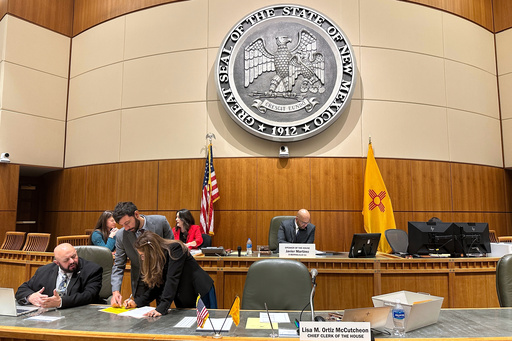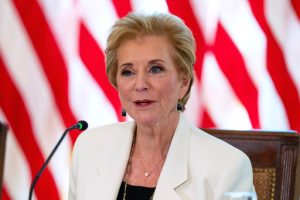SANTA FE, N.M.
By MORGAN LEEAssociated Press
New Mexico legislators are pushing to shore up safety-net spending in response to President Donald Trump’s spending and tax cuts, in a state with one of the highest enrollment rates for Medicaid and federal food assistance. In a special legislative session Wednesday, legislators sought out new state spending on food assistance, while Gov. Michelle Lujan Grisham is calling for a quick response to federal Medicaid cuts. Leading Democratic legislators also want to backfill federal spending cuts to public broadcasting. New Mexico could also become the latest state to break with the federal government on vaccine policy and recommendations.
SANTA FE, N.M. (AP) — New Mexico legislators pushed to shore up safety-net spending Wednesday in response to President Donald Trump’s spending and tax cuts, in a state with one of the highest enrollment rates for Medicaid and federal food assistance.
State legislators in the Democratic majority weren't waiting for resolution of the federal budget standoff and government shutdown, as they advanced a bill to expand New Mexico's own insurance subsidies on the Affordable Care Act exchange. Exchange subsidies are a sticking point of the standoff in Washington.
Lawmakers also are seeking new state spending of food assistance, while Gov. Michelle Lujan Grisham calls for grants to stabilize health care services in rural areas where clinics and hospitals often rely heavily on Medicaid.
“We’re not going to sit back and watch our health care system, our food support system, be devastated," said Democratic state Senate Majority Peter Wirth of Santa Fe, at the start of a special legislative session.
Leading Democratic legislators also want to backfill federal spending cuts to public broadcasting. New Mexico could also become the latest state to break with the federal government on vaccine policy and recommendations.
Democrats including House Speaker Javier Martínez of Albuquerque have acknowledged that many federal health care changes don’t kick in until 2027 or later. But Martínez said that there is an urgent need to fund rural health care and offset other cuts.
New Mexico expects to lose about $200 million annually because of new federal tax cuts. But this fiscal year, it still has a large surplus thanks to booming oil production.
Republican legislators said big changes to Medicaid are still far away and that New Mexico should focus on reducing errors in benefit distributions.
“The grand cuts to Medicaid? Well, they’re not happening, at least not for 18 months,” said Republican state Senate Minority Leader Bill Sharer of Farmington. “What the federal government is doing now is saying, ‘Hey, we need to clean up our act.’”
Nearly one-fourth of New Mexico residents receive food assistance through the Supplemental Nutrition Assistance Program.
“It’s really the first line of defense. It’s not our only solution to food insecurity, but it’s a big one,” said Sovereign Hager, legal director at the New Mexico Center on Law and Poverty.
New Mexico legislators are considering a quick infusion of state spending on food assistance through SNAP and to food banks.
Trump plans to expand work and reporting requirements for SNAP participants, end eligibility for many noncitizens, and change benefit calculations.
Jasmin Jaquez and her 7-year-old son rely on the program. She said she is on edge about changes to SNAP benefit calculations during her final year at New Mexico State University.
“It's one big, huge help that's getting me through college, and attending full-time," said Jaquez, of Sunland Park.
Expanded grants would sustain rural health clinics and hospitals that rely heavily on Medicaid spending. Rural health care providers across the country are preparing to lose billions of dollars from Trump’s signature tax and spending cut bill signed into law this summer.
Trump's bill sets aside $50 billion over five years for rural hospitals, providers and clinics — but that may not offset significant cuts. The stakes are high in New Mexico, where about 38% of residents rely on Medicaid.
Many Democratic-led states have begun making their own recommendations for who should be vaccinated for seasonal respiratory viruses, including the flu and COVID-19, saying the Trump administration has jeopardized public health by politicizing the U.S. Centers for Disease Control and Prevention.
New Mexico lawmakers are considering a similar shift to state standards for the immunization of children and adults.
Wirth said changes are needed to ensure access and consistency on childhood vaccines.
New Mexico legislators are also considering spending millions of dollars for public broadcasters in television and radio as federal funds dry up.
The Corporation for Public Broadcasting, which finances NPR and PBS, has announced its closure after being defunded by Congress. Trump also signed federal legislation in July that rescinds more than $1 billion earmarked for public broadcasters.
The clawback sent shock waves through at least 13 public radio and television broadcasters across New Mexico, said Franz Joachim, general manager at New Mexico PBS.
Many, including five tribal radio stations in New Mexico, relied on community public service grants from the Corporation for Public Broadcasting, said Loris Taylor, president of Native Public Media.





